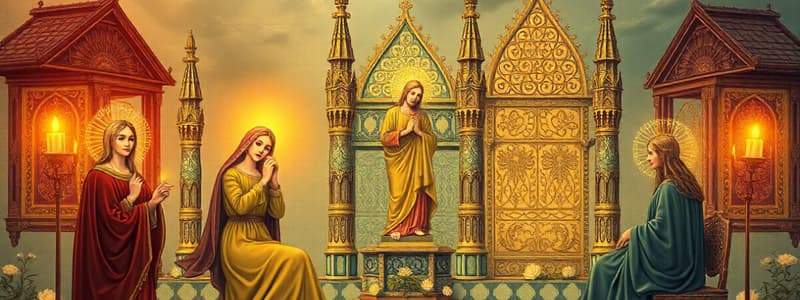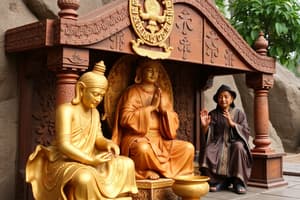Podcast
Questions and Answers
Which scenario best illustrates how the definition of 'religion' can be subjective and dependent on context?
Which scenario best illustrates how the definition of 'religion' can be subjective and dependent on context?
- A philosophical debate on the existence of a higher power.
- A historical analysis of the Protestant Reformation in 16th-century Europe.
- The Missouri government reclassifying yoga classes for tax purposes, while parents in California sue claiming yoga in schools promotes Hinduism. (correct)
- A group of scientists studying the origins of the universe.
Émile Durkheim's definition of religion as a system of beliefs and practices surrounding the 'sacred' is useful, but what is its primary limitation?
Émile Durkheim's definition of religion as a system of beliefs and practices surrounding the 'sacred' is useful, but what is its primary limitation?
- It's difficult to apply to traditions with shared beliefs.
- It's overly broad, potentially including secular practices like fandom or brand loyalty. (correct)
- It is too specific and only applies to organized religions.
- It requires a belief in a higher power, excluding some belief systems.
How did the Protestant Reformation influence the modern understanding of 'religion'?
How did the Protestant Reformation influence the modern understanding of 'religion'?
- By standardizing religious practices across Western Europe.
- By reinforcing the authority of the Church in all aspects of life.
- By establishing the concept of religion as a private, personal relationship with the divine. (correct)
- By promoting the sale of indulgences to fund church building projects.
During the colonial era, how did Europeans' perception of 'religion' impact their interactions with Indigenous cultures?
During the colonial era, how did Europeans' perception of 'religion' impact their interactions with Indigenous cultures?
What real-world consequences can arise from a government's decision to deny a particular tradition the label of 'religion'?
What real-world consequences can arise from a government's decision to deny a particular tradition the label of 'religion'?
Why is it important to be conscious of the definition of 'religion' that we use?
Why is it important to be conscious of the definition of 'religion' that we use?
Paul Tillich's definition of religion as 'the state of being grasped by an ultimate concern' aims to highlight what?
Paul Tillich's definition of religion as 'the state of being grasped by an ultimate concern' aims to highlight what?
What is a primary distinction between creedal and votive religions?
What is a primary distinction between creedal and votive religions?
The Arabic word 'din' originally meant 'custom' or 'law.' Why is it problematic to directly translate it as 'religion' in ancient texts like the Qur'an?
The Arabic word 'din' originally meant 'custom' or 'law.' Why is it problematic to directly translate it as 'religion' in ancient texts like the Qur'an?
How does the example of Rastafari adherents being incarcerated for smoking marijuana illustrate the complexities of religious freedom?
How does the example of Rastafari adherents being incarcerated for smoking marijuana illustrate the complexities of religious freedom?
According to the content, what is one of the main problems when trying to define 'religion'?
According to the content, what is one of the main problems when trying to define 'religion'?
The example of the Uighurs and other Turkic Muslims being held in re-education camps in China is used to illustrate what point?
The example of the Uighurs and other Turkic Muslims being held in re-education camps in China is used to illustrate what point?
Why did Martin Luther advocate for the separation of church and state?
Why did Martin Luther advocate for the separation of church and state?
What assumption did Europeans often make when encountering Indigenous people's traditions during the colonial era?
What assumption did Europeans often make when encountering Indigenous people's traditions during the colonial era?
The author mentions sports like soccer, synchronized swimming, curling and even pickleball to illustrate which point about religion?
The author mentions sports like soccer, synchronized swimming, curling and even pickleball to illustrate which point about religion?
How do Native Hawaiians honoring the sacredness of the Mauna Kea volcano challenge the traditional European understanding of 'religion'?
How do Native Hawaiians honoring the sacredness of the Mauna Kea volcano challenge the traditional European understanding of 'religion'?
What is the significance of the story about the California school kids calling the lotus position 'crisscross applesauce'?
What is the significance of the story about the California school kids calling the lotus position 'crisscross applesauce'?
What is the key takeaway regarding the definition of religion?
What is the key takeaway regarding the definition of religion?
Orthodoxy and orthopraxy differ in that:
Orthodoxy and orthopraxy differ in that:
What motivated the U.S. state of Missouri to attempt to reclassify yoga?
What motivated the U.S. state of Missouri to attempt to reclassify yoga?
How can defining religion impact legal protections?
How can defining religion impact legal protections?
Which of the following does the content suggest might be considered a religion under a broad definition?
Which of the following does the content suggest might be considered a religion under a broad definition?
What is the main argument against defining religion as simply 'belief in a higher power'?
What is the main argument against defining religion as simply 'belief in a higher power'?
What does the term 'ultimate concern' refer to?
What does the term 'ultimate concern' refer to?
Why is it problematic to use the term 'religion' as a universal label when studying different cultures?
Why is it problematic to use the term 'religion' as a universal label when studying different cultures?
In the context of the Protestant Reformation, what did the sale of 'indulgences' involve?
In the context of the Protestant Reformation, what did the sale of 'indulgences' involve?
According to the content, what can occur when a country legally protects 'normal religious activities'?
According to the content, what can occur when a country legally protects 'normal religious activities'?
How does the Indian law that created a fast-track to citizenship for refugees, excluding Muslims, demonstrate the potential for weaponizing the classification of religion?
How does the Indian law that created a fast-track to citizenship for refugees, excluding Muslims, demonstrate the potential for weaponizing the classification of religion?
The philosopher Lord Herbert of Cherbury proposed fundamental truths about religion. What is one of them?
The philosopher Lord Herbert of Cherbury proposed fundamental truths about religion. What is one of them?
How did defining religion as a personal, private belief system support the interests of Protestants during the Reformation?
How did defining religion as a personal, private belief system support the interests of Protestants during the Reformation?
Flashcards
Fraught
Fraught
Filled with or likely to cause anxiety or tension.
Creedal
Creedal
Relating to a creed, a statement of faith or principles.
Votive
Votive
Related to a wish or desire, often in a religious context.
Orthodoxy
Orthodoxy
Signup and view all the flashcards
Orthopraxy
Orthopraxy
Signup and view all the flashcards
Indulgence
Indulgence
Signup and view all the flashcards
Sacrament
Sacrament
Signup and view all the flashcards
Ultimate Concern
Ultimate Concern
Signup and view all the flashcards
Polytheistic
Polytheistic
Signup and view all the flashcards
Monotheistic
Monotheistic
Signup and view all the flashcards
Animistic
Animistic
Signup and view all the flashcards
Reformation
Reformation
Signup and view all the flashcards
Colonial
Colonial
Signup and view all the flashcards
Demonize
Demonize
Signup and view all the flashcards
Religions
Religions
Signup and view all the flashcards
Creedal Religions
Creedal Religions
Signup and view all the flashcards
Votive Religions
Votive Religions
Signup and view all the flashcards
Orthodoxy
Orthodoxy
Signup and view all the flashcards
Orthopraxy
Orthopraxy
Signup and view all the flashcards
Din (Arabic)
Din (Arabic)
Signup and view all the flashcards
Religio (Latin)
Religio (Latin)
Signup and view all the flashcards
Religion (Post-Reformation)
Religion (Post-Reformation)
Signup and view all the flashcards
Study Notes
- "Religion" is a fraught word, with varying interpretations depending on who is defining it and their interests.
Defining Religion
- Religions are frameworks that help people organize, shape, and make sense of their lives.
- This definition is broad, as even veganism of devotion to a sports team could be considered a religion.
- No single definition encompasses all expressions of religion.
- Defining religion impacts many lives, regardless of religious affiliation.
- Lord Herbert of Cherbury proposed belief in a higher power as a fundamental truth about religion in the 17th century.
- Many religions involve gods and goddesses, but some, like Jainism and Buddhism, focus on ethics and self-transformation instead.
- Creedal religions share a belief system and are often linked to sacred texts.
- Votive religions, such as the Soto Zen school of Buddhism, emphasize action over beliefs.
- Some religions focus on both belief and action, such as Islam's emphasis on orthodoxy and orthopraxy.
- "Religion" is like the word "sports," it lumps together many different practices.
- The definition of religion is specific to the societies, just like the practices themselves themselves.
- Émile Durkheim defined religion as a system of beliefs and practices surrounding the "sacred."
- The "sacred" can be anything a community gives special meaning to.
- Recognizing whose interests are served by specific definitions is important due to the absence of any shared features of "religions".
- Yoga teachers opposed Missouri’s reclassification of yoga as exercise, arguing its spiritual ties are inherent.
- A judge acknowledged yoga is religious, but ruled that school yoga isn’t religious enough as it was taught to children.
History of Religion
- The modern concept of "religion" as a separate sphere of society is relatively recent.
- Until a few centuries ago, many languages lacked a word for "religion" as it is currently understood.
- The Arabic word "din" meant "custom" or "law" and the Latin word "religio" meant "rules".
- The idea of "religion" as a personal belief system emerged in 16th-century Western Europe.
- During the Protestant Reformation, Martin Luther advocated for separation of church and state.
- The Reformation redefined "religion" in Western Europe as a personal relationship with the divine.
- During the colonial era, Europeans encountered diverse religious practices.
- Traditions of Indigenous peoples often related to ancestors or the land.
- Europeans assumed "religions" to be Christianity-shaped.
- This model of "religion" prioritizes some traditions over others.
Impacts of the "Religion" Label
- Calling something a "religion" can have tangible benefits.
- These can include tax exemption and legal protection.
- Denying the label of religion has real-life consequences.
- Many countries protect religious freedom.
- The definition of religion determines who is afforded this freedom.
- China's government has detained Uyghurs and other Turkic Muslims in re-education camps.
- A 2019 law in India created a fast-track to citizenship for refugees from some religious groups, excluding Muslims.
- Governments have used their classification of religion to demonize, control, and exclude certain groups.
- Unrecognized religious practices are deemed illegitimate or illegal.
- Rastafari adherents have been incarcerated for smoking marijuana, which they see as a sacrament.
- In North Korea, Christians and followers of Korean folk religion have been arrested, tortured, and executed.
Conclusion
- There is no single way to define religion or do religion.
- It is important to be conscious of the definition being used and who controls its boundaries.
- Paul Tillich defined religion as "the state of being grasped by an ultimate concern."
- There are many ways to define, debate, and practice religion.
- The idea of an "Ultimate Concern" can be valuable, but can also be dangerous.
Studying That Suits You
Use AI to generate personalized quizzes and flashcards to suit your learning preferences.




